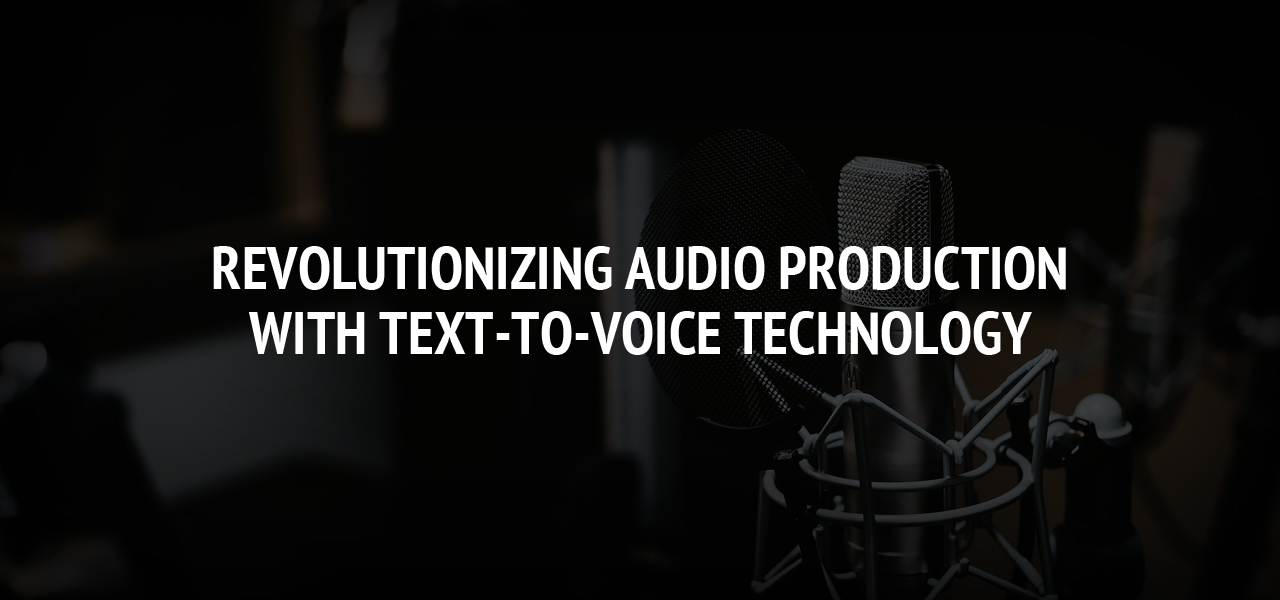Revolutionizing Audio Production with Text-to-Voice Technology

Audio production has become a crucial content creation component in today's fast-paced digital age. Whether it's creating audiobooks, podcasts, e-learning materials, or even commercial ads, audio production has gained significant traction in recent years. However, traditional audio production methods can be time-consuming and expensive, requiring the involvement of voice actors, sound engineers, and audio editors. This is where text-to-voice technology is revolutionizing audio production by automating the voice-over process.
What is Text-to-Voice Technology?
Text-to-voice technology, or text-to-speech, is an AI-based technology that converts written text into spoken audio. It uses natural language processing and machine learning algorithms to analyze and understand the text and generate a synthetic voice that sounds like a human speaker. You can search for any Speechelo review on the internet to know how text-to-voice has significantly improved the process of audio production.
Revolutionizing Audio Production
Text-to-voice technology has revolutionized the way audio production is done. Here are some ways it has impacted the industry.
- Faster Turnaround Time: With text-to-voice technology, audio production can be done in a fraction of the time it would take with traditional methods. Voice actors no longer need to record multiple takes, and sound engineers no longer need to edit and mix audio files. Text-to-voice technology can generate high-quality audio in minutes, allowing content creators to produce more content faster.
- Cost-Effective: Traditional audio production can be expensive, with hiring voice actors and sound engineers adding up quickly. This technology is much more cost-effective, eliminating the need for human involvement in the voice-over process.
- Consistent Quality: Text-to-voice technology ensures consistent quality in audio production. Human voice actors may tire or have varying performance levels, leading to inconsistencies in the final product. With text-to-voice technology, the synthetic voice can be fine-tuned to match the content's tone, pace, and style, ensuring consistent quality throughout the production.
- Accessibility: Text-to-voice technology has also made audio production more accessible. People with speech impairments or disabilities can now use text-to-voice technology to create audio content without needing a voice actor. This has opened opportunities for more people to enter the audio production industry and create more diverse content.
Transform your Voice-over Videos with this Technology
Voice-to-text technology is revolutionizing voice-over videos by automating the transcription process, making it faster and more accurate. With this technology, video producers no longer need to transcribe audio recordings, manually saving valuable time and effort. This also allows for faster editing and post-production, enabling video producers to deliver high-quality content more efficiently. In addition, many Speechelo reviews testify that voice-to-text technology makes translating and localizing videos easier because the transcription can be used as the basis for subtitles or voice-over translations. Overall, voice-to-text technology transforms how voice-over videos are created, making the process more streamlined and efficient.
Conclusion
Text-to-voice technology has revolutionized audio production, making it faster, more cost-effective, and more accessible. It has opened opportunities for more people to enter the industry and create more diverse content. However, it has limitations and challenges, such as lacking emotional expressiveness and personalization. As AI and deep learning advance, the text to voice technology will become even more sophisticated and natural-sounding. Content creators need to weigh the advantages and disadvantages of text-to-voice technology and decide whether it's the right fit for their needs.
About The Author
Related Blog
View All-
6 Must-Have Apps for Bloggers
Bloggers are the Internet's educators, storytellers, and communication facilitators. Without them, we wouldn't know which styles are in and which vacation spots we can't miss out on. Despite all they provide us with, bloggers aren't superhuman. ...
-
5 Best Android Apps to Make Money
Everybody in this world wants extra money now and then. So as that it is about foolish as trying to make believe that will earn living sitting at home doing nothing there are no apps can make easy money for you. Whether it is about selling clothes at consignment ...







